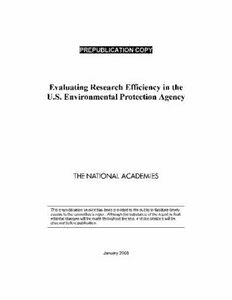Download Evaluating Research Efficiency in the U.S. Environmental Protection Agency PDF Free - Full Version
Download Evaluating Research Efficiency in the U.S. Environmental Protection Agency by Committee on Evaluating the Efficiency of Research and Development Programs at the U.S. Environmental Protection Agency, National Research Council in PDF format completely FREE. No registration required, no payment needed. Get instant access to this valuable resource on PDFdrive.to!
About Evaluating Research Efficiency in the U.S. Environmental Protection Agency
A new book from the National Research Council that recommends changes in how the federal government evaluates the efficiency of research at EPA and other agencies. Assessing efficiency should be considered only one part of gauging a program's quality, relevance, and effectiveness. The efficiency of research processes and that of investments should be evaluated using different approaches. Investment efficiency should examine whether an agency's R&D portfolio, including the budget, is relevant, of high quality, matches the agency's strategic plan. These evaluations require panels of experts.In contrast, process efficiency should focus on "inputs" (the people, funds, and facilities dedicated to research) and "outputs" (the services, grants, publications, monitoring, and new techniques produced by research), as well as their timelines and should be evaluated using quantitative measures. The committee recommends that the efficiency of EPA's research programs be evaluated according to the same standards used at other agencies. To ensure this, OMB should train and oversee its budget examiners so that the PART questionnaire is implemented consistently and equitably across agencies.
Detailed Information
| Author: | Committee on Evaluating the Efficiency of Research and Development Programs at the U.S. Environmental Protection Agency, National Research Council |
|---|---|
| Publication Year: | 2008 |
| ISBN: | 9780309116855 |
| Pages: | 153 |
| Language: | English |
| File Size: | 0.533 |
| Format: | |
| Price: | FREE |
Safe & Secure Download - No registration required
Why Choose PDFdrive for Your Free Evaluating Research Efficiency in the U.S. Environmental Protection Agency Download?
- 100% Free: No hidden fees or subscriptions required for one book every day.
- No Registration: Immediate access is available without creating accounts for one book every day.
- Safe and Secure: Clean downloads without malware or viruses
- Multiple Formats: PDF, MOBI, Mpub,... optimized for all devices
- Educational Resource: Supporting knowledge sharing and learning
Frequently Asked Questions
Is it really free to download Evaluating Research Efficiency in the U.S. Environmental Protection Agency PDF?
Yes, on https://PDFdrive.to you can download Evaluating Research Efficiency in the U.S. Environmental Protection Agency by Committee on Evaluating the Efficiency of Research and Development Programs at the U.S. Environmental Protection Agency, National Research Council completely free. We don't require any payment, subscription, or registration to access this PDF file. For 3 books every day.
How can I read Evaluating Research Efficiency in the U.S. Environmental Protection Agency on my mobile device?
After downloading Evaluating Research Efficiency in the U.S. Environmental Protection Agency PDF, you can open it with any PDF reader app on your phone or tablet. We recommend using Adobe Acrobat Reader, Apple Books, or Google Play Books for the best reading experience.
Is this the full version of Evaluating Research Efficiency in the U.S. Environmental Protection Agency?
Yes, this is the complete PDF version of Evaluating Research Efficiency in the U.S. Environmental Protection Agency by Committee on Evaluating the Efficiency of Research and Development Programs at the U.S. Environmental Protection Agency, National Research Council. You will be able to read the entire content as in the printed version without missing any pages.
Is it legal to download Evaluating Research Efficiency in the U.S. Environmental Protection Agency PDF for free?
https://PDFdrive.to provides links to free educational resources available online. We do not store any files on our servers. Please be aware of copyright laws in your country before downloading.
The materials shared are intended for research, educational, and personal use in accordance with fair use principles.

